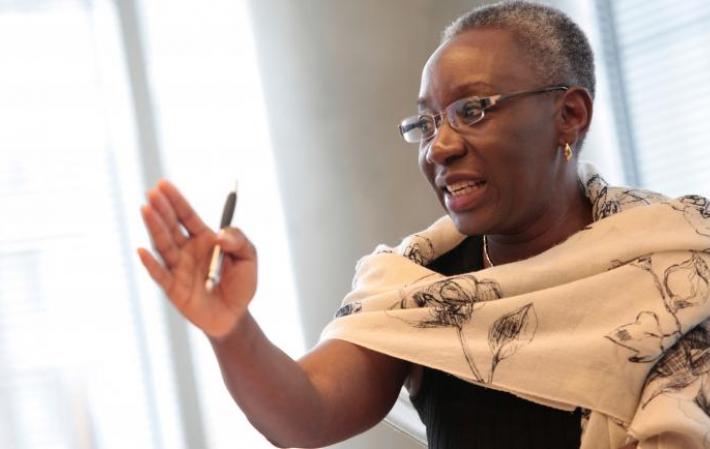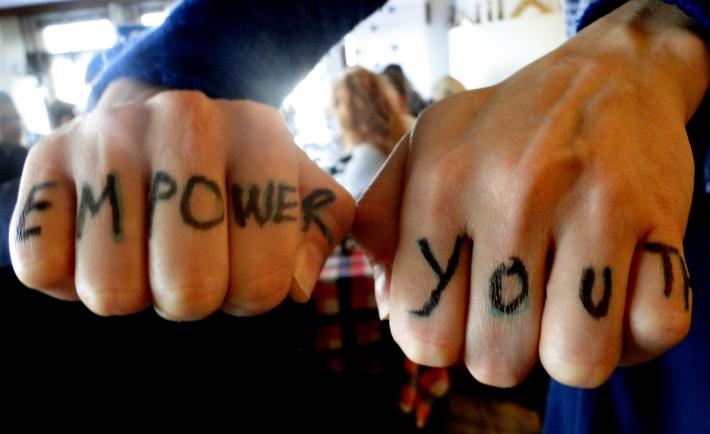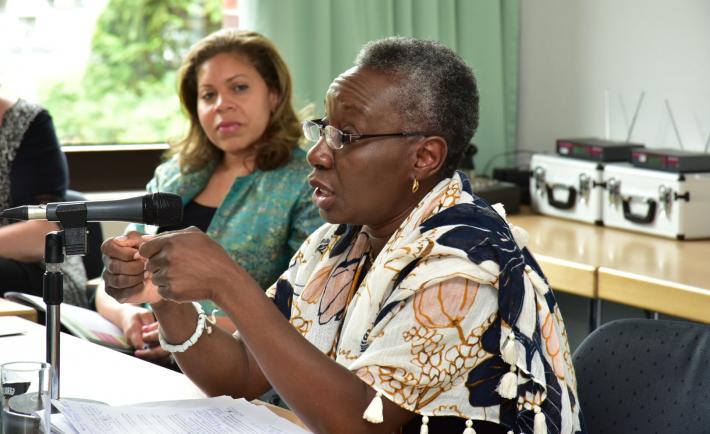
Sandra Pepera, Senior Associate and Director for NDI's Gender, Women and Democracy team.
Conflict thrives in divided societies, particularly when individuals in positions of power exploit differences for personal or political gain. Many factors, including scarcity of resources and recent histories of intergroup strife, can further exacerbate divisions and drive citizens apart based on political, ethnic, religious and other identity factors. When allowed to deepen, these divides threaten social cohesion and undermine the foundation of cooperation and collective action in democratic societies. As polarization increases, so do the challenges faced by governing institutions. Strengthening inclusive democracies can reduce polarization and bridge intergroup divisions by bringing communities together to pursue shared interests and to develop sustainable intergroup relationships.
As in previous years, Global Legislative Openness Week (GLOW) showcased the fantastic work being done around the world to realize the principles of open parliament. Organized by members of the Open Government Partnership’s Legislative Openness Working Group, GLOW featured more than 20 events and activities organized by parliaments and civil society organizations in over 15 countries around the world. This year included a diverse range of activities, such as public events and private meetings, campaigns and advocacy, and hackathons and the development of new digital tools. The diversity of approaches and actors that made Global Legislative Openness Week a success also demonstrates that the global movement for open, responsive legislatures is broad, deep, and growing.

Members of the Defense and Security Commission of Burkina Faso's National Assembly meet members of the armed forces during an informational visit to a military base in Kaya.
Violence and crime pose serious threats to citizen security. A lack of response to these threats from authorities erodes public trust in government institutions and weakens prospects for stable democracy. Maintaining the peace and ensuring the security of citizens is necessary for a democracy to develop and endure. Likewise, democratic institutions, such as parliaments, media and civil society, help guarantee a focus on citizen interest and public good, especially related to civilian oversight of the security sector. Threats to citizen security are particularly notable in West Africa’s Sahel region and Central America’s Northern Triangle, areas where NDI works to bridge the gap between citizens’ security needs and the state’s ability to meet them.
For the first time in Nepal’s history, pre-budget discussions took place outside of the nation’s capital city of Kathmandu. Since 2014, Nepal's Legislature Parliament Finance Committee has worked with NDI to increase citizen participation, especially in the area of citizen input in the budget process through public consultations. NDI offered its support to the Finance Committee by organizing Committee-led pre-budget discussions throughout 2015 and 2016 to reach out to citizens in the hill, mountain and Tarai regions. The discussions fostered dialogue between Nepali citizens and the parliament, thus opening the decision-making processes to more people. Consultations equipped the Finance Committee with the information and confidence it needed to make improving the overall budget process a priority prior to the finalization of Nepal's new constitution.
In Lebanon, which is surrounded by countries in crisis, real power is held at the local level. The national government is trusted to protect borders and provide security, but it is the local municipality that largely provides basic services. Yet understanding how municipalities work is a challenge in Lebanon. Budgets are not made public and municipal websites are nonexistent, even in Beirut. Political parties hold power and corruption can be systemic. Youth in Lebanon do not have much opportunity in school to learn about democracy, the role of municipalities, or how they can be involved in governance. Determining how to have an impact can be difficult when the political system is so opaque. To help address this problem, NDI has been working for several years to empower youth and women to play a greater role in politics. The NDI team in Lebanon is working with local partners, such as NABAD, to provide basic training on how to impact political decisions at the municipal level. Hundreds of youth have already been trained and some have even run and been elected to office.
NDI marks International Day of Peace by launching a blog series on supporting democratic resilience to violent conflict. Pictured above, Zambian youth leaders meet with Martin Luther King III at an NDI-sponsored event to provide young leaders with anti-violence training and a platform on which to speak out against electoral violence.
A key goal of democratization is peaceful politics. Political battles may be inevitable, but in stable democracies they are not waged by armed groups, but through institutions such as elections, parliaments, the media, and civil society organizations. Through its focus on peace, security, and democratic resilience, NDI helps democratic actors recover from violent conflict and manage the myriad of shocks and stressors that threaten to tip fragile democracies into violence. This blog post is the first in a series marking the International Day of Peace on September 21 that will highlight NDI’s approaches to supporting resilient democracies.
Just weeks before the annual Concordia Summit in New York, NY on September 19th and 20th, the National Democratic Institute and Concordia partnered to host a TweetTalk as an extension of the panel, “Helping Democracy Deliver: Tunisia as an Example of Economic and Political Transition.” Like the panel, the TweetTalk aimed to explore themes like extremist activity in Libya as a threat to Tunisian progress, and whether decentralization can address regional inequalities.

During an NDI workshop in Kosovo, a participant displays the message for a inter-ethnic advocacy campaign. Arta Qorri
International Youth Day 2016 comes at a time when the United Nations and other members of the international development community are recognizing youth as champions for sustainable development. This reflects an ongoing shift in perspectives from fearing the ‘youth bulge’ as a problem to be solved, to partnership with young women and men as leaders and a demographic dividend that can accelerate global progress. Today’s youth – the most connected, educated and open-minded generation the world has seen – have the power to foster innovative and transformative change.
.jpg)
In Côte d’Ivoire, the Plateforme des organisations de la société civile pour l’observation des élections en Côte d’Ivoire recruited significant numbers of female election observers in a post-conflict context. For many of these women, it was their first experience in political activism.
Election observation initiatives are most effective when their findings are not only valid but also—more importantly—accepted as such by the majority of citizens. Observation teams should reflect the diversity of the population so that observer groups can truly speak in the name of all citizens. Gender balance is an important consideration in the composition of observer teams and leadership structures, both of which influence public perceptions of the observer group.
Integrating women into an observation effort helps ensure a more comprehensive understanding of the different barriers to political participation that men and women face. It is also an important step to advance observation strategies that address the distinctive ways electoral violence affects citizens.

Rockefeller Foundation's Sundaa Bridgett-Jones listens to NDI's Sandra Pepera at ICLEI's Resilient Cities Forum in Bonn in July 2016. Photo Credit: ICLEI-Local Governments for Sustainability
More than half of the world’s population now lives in urban areas. As the forces of globalization rapidly draw more people to urban centers in search of socioeconomic opportunity, we must ask: How do we ensure our cities are safe, sustainable and resilient?
When considering city resiliency, we think immediately of physical necessities: will people have access to clean water, sturdy buildings, safe roads and public transport? Will the city be environmentally sustainable, and be able to weather and recover from natural disasters?
Resilience, though, isn’t only about civil engineering -- it’s also about politics and governance. Inclusive and responsive democracies minimize insecurity and help protect particularly vulnerable community members from potential shocks and stressors. Democracies based on these values guard against instability and conflict and work to address the needs of their populaces, especially in circumstances where the population is diverse and may have competing interests.